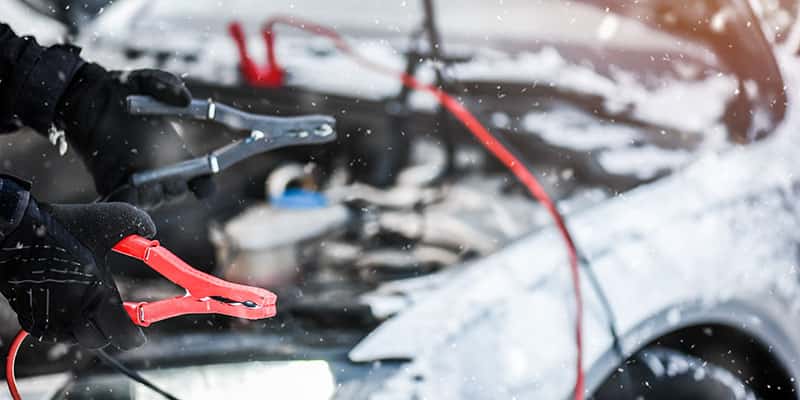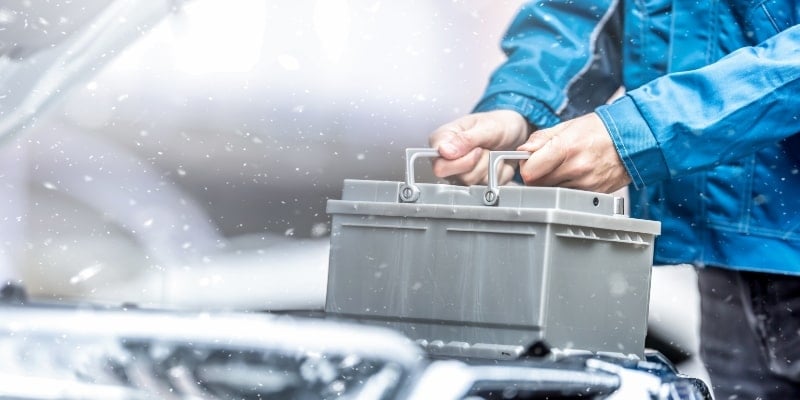Cold weather kills batteries – and slashes storage capacity.
That's because low temperatures increase battery resistance, reduce charge acceptance, and can even crack cases or freeze batteries.
Fortunately, you can avoid or mitigate most cold-weather damage with a few simple steps:
Tip #1: Install or store batteries in a cool, dry place where temperatures are above freezing
- For batteries in a mobile application, store and charge them in mild temperatures rather than outside or in freezers.
- If your batteries stay in one place, store them in a well-insulated location with high thermal mass (to stabilize temperature), no direct sunlight, and proper ventilation. (The National Electrical Code Article 490.9(A) provides recommendations.)
- Enclosed areas like garages, storage facilities, and wood surfaces are best.
- Avoid placing batteries directly on the ground; this creates a thermal bridge – and the earth acts as a heat sink, further lowering battery temperature.
- Ambient temperature ranges between 50°F (10°C) and 85°F (approx. 30°C) are best.
- Store batteries in a well-ventilated space, far away from flammable materials and other electronics – to prevent electrical discharges that lead to sparks. Ensure space between batteries and enclosure walls to allow for air circulation – and ensure stable room and battery temperatures.
Tip #2: EVEN BATTERIES ADVERTISED AS "ZERO MAINTENANCE" STILL REQUIRE PERIODIC INSPECTION – ESPECIALLY IN EXTREME TEMPERATURES.
- Always schedule and perform regular maintenance such as cleaning off corrosion, securing terminal connections, and equalizing batteries (lead-acid) or removing a charge from high cells to low cells (lithium-ion).
- Make maintenance easy: Keep safety equipment nearby, including protective gloves, glasses, and clothing.
- See our "Safety.First." guides (Starting Battery Safety.First. or Deep Cycle Safety.First.) for easy-to-follow instructions and strategies for safe and simple maintenance. Or, click here to view our Forklift Battery Service Manual.
Tip #3: If you connect batteries to a charger (e.g., for a forklift), consider using a smart charger
Smart chargers adjust energy delivery based on ambient and battery temperatures and other factors.
Tip #4: Find out whether a battery monitor or battery management system (BMS) is right for you
- BMS monitors battery health: operating temperatures, total and per-cell voltage, depth of discharge, and other critical factors for battery health.
- It also alerts you to problems when they are easily fixed, recommends emergency maintenance, and ensures proper charging – often over the Internet from anywhere in the world.
BMS makes it much easier to maintain proper charging and maintenance, improving reliability, lifespan, and winter weather performance.
Note that lithium-ion batteries have mandatory BMS for safety reasons. For lithium-ion, this reduces the risk of overcharging – and thermal runaway that leads to explosions and fires.
Tip #5: Double-check your battery sizing
In cold temperatures, batteries lose approximately 10% of their capacity for every 15°F to 20°F they drop below 80°F (15°C to 18°C below 26.7°C).
Resistance increases, and batteries’ ability to accept a charge and reach full capacity decreases.
Although this capacity decrease is temporary, it's harmful because you won't get the amount of energy you need when you need it.
So, if you can't guard batteries against low temperatures, then be sure to invest in larger or more batteries to make up for decreased capacity.
Tip #6: Select the right batteries
Batteries aren’t created equal, and some battery chemistries will not operate or accept a charge, even at temperatures above freezing. Be sure to ask your battery distributor or representative about your products' cold-weather operating and charging capabilities. And make sure to get everything in writing.
Tip #7: Be cautious of recommendations if you operate batteries in cold conditions...
Be cautious if someone recommends you size your battery bank for 80% Depth of Discharge (DoD) (i.e., just 20% of capacity is left during regular use). If cold temperatures reduce your battery capacity, you may not have enough power reserves to make it through the day.
With these strategies, you'll protect your batteries from winter weather – and maximize lifespan and storage capacity.
BONUS TIP: If you’re looking for cold-weather batteries – or advice – click the button below to connect with our battery experts… or find a dealer near you.












